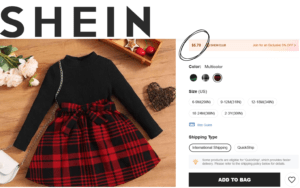China’s hot, fast fashion exporter, Shein, was put under the microscope at labs contracted by Bloomberg to see if any of the clothing was made from cotton sourced in Xinjiang. And, guess what…it was.
Two batches of clothes purchased from Shein — one ordered in March and a second in July — were shipped to Agroisolab GmbH in Jülich, Germany for analysis. The clothes were chosen from about 60,000 items that turned up in a search for “cotton” on Shein’s U.S. website.
Agroisolab tested the items using stable isotope analysis, which measures variations in the isotopes of carbon, oxygen, and hydrogen present in the cotton’s fibers to indicate the altitude and other climate characteristics of the region where it was grown, Bloomberg reported in an article published on Sunday.
The cotton in those clothing items was compared with fabric sourced directly from Xinjiang that Bloomberg said it obtained from an unidentified U.S. company in China. Shein clothes were also compared with another sample the German lab had previously obtained from Xinjiang. The first batch of Shein garments, which included pants and a blouse, matched both Xinjiang samples with only slight variations.
The Bloomberg article called out a trade loophole called the “de minimis” exemption, which allows for packages of goods valued at $800 or less to be shipped to the U.S. duty-free. Most of those packages would avoid scrutiny by Customs agents.
Shein would unlikely exist without de minimis, as it can basically set up shop on an app or website hosted here, and sell directly to American consumers from China.
Shein buys clothing from hundreds of different producers around China, many of them small sewing shops making clothes almost exclusively for the U.S. market. Shein’s corporate offices would have to conduct due diligence on all of these small producers to ascertain who may be using cotton textiles sourced from Xinjiang.
According to the German lab, it did not take too much digging to find Shein gear made from Xinjiang cotton.
Last December, President Biden signed the Uyghur Forced Labor Prevention Act into law. The law was enacted to strengthen existing restrictions against numerous goods – of which cotton is one – that are made wholly or in part with forced labor from Xinjiang. It created a presumption of guilt if Xinjiang was part of the supply chain, and required the transacting companies to prove their supply chain was clean.
How can anyone compete with this pricing? Not even U.S. textile and apparel trade from Central America can compete with Shein pricing.
Cotton from Xinjiang has likely made its way into the U.S. since the law was enacted simply because the majority of China’s cotton comes from the region. The U.S. banned cotton from Xinjiang because of Uyghur prison labor believed to be working for state-owned farm operations, led by the Xinjiang Production and Construction Corp. Small package shipments, however, are at best run through a drug and weapons testing machine. “If you are doing a traditional import from a ship, Customs and Border Patrol has that ship’s manifest for months in advance and have a complete list of everything on that ship, including where it is from,” said Charles Benoit, trade counsel for CPA. “So if you had a shipment of apparel from China on that boat, they’ll be prepared to go and look at it because of the forced labor prevention law. There is no machine in the world that Customs owns that can detect Xinjiang cotton in a T-shirt as it rolls down the line in a parcel package,” Benoit said. “If you got rid of de minimis as an avenue of commerce, you’d get rid of Shein and leave the market up to responsible retailers like American Eagle, for example.”
CPA sent a letter to Customs and Border Protection (CBP) on September 23 requesting a review of Shein imports.
Currently, CBP does not receive even basic data on the contents of de minimis packages that enter the U.S.—a serious loophole that impedes the agency from ensuring goods made with forced labor do not enter the U.S. market.
The duty-free de minimis level was increased from around $200 to $800 in 2016. That’s led to less visibility, more shipments, and a lot less information about what is in those packages. Goods that would normally be tariffed at ports can come into the country without a tariff if the item is priced at $800 or less.
In the September letter, CPA called for closing the de minimis loophole and supports U.S. Representative Earl Blumenauer’s (D-OR) Import Security and Fairness Act to do just that.
CBP Deputy Executive Assistant Commissioner John Leonard told the National Customs Brokers & Forwarders Association of America that “China has a free trade deal with the U.S.: it’s called de minimis.”
In May, Morning Consult conducted a poll on behalf of CPA showing 81% of voters think the U.S. should prohibit certain countries that pose a threat to American workers from using the de minimis loophole. Some 76% of respondents said they were concerned that the current U.S. de minimis value allowed China to import a greater amount of goods into the United States with less likelihood of inspection, whether it is clothes, supplements, or home goods sold directly to U.S. consumers via ads on YouTube, or product listings on Amazon.
Poll: Voters Overwhelmingly Support Prohibiting China from Exploiting De Minimis Loophole














